By Chris Watson
Dogs have been a part of our lives for a long time. The oldest documented association between humans and dogs is a grave dated to 14,000 years ago (article from Journal of Archaeological Science). According to that study a puppy was not only buried lovingly with a family but showed all the hallmarks of a well-cared for companion. So, it is no surprise that our canine associates have become more than pets. Thanks to the work of Assistance Dogs for Achieving Independence (ADAI), assistance and therapy dogs are essential in helping many throughout our region move into productive and more fulfilling lives.
ADAI, now a program of The Ability Center (ACT), has one priority: help individuals with disabilities achieve greater independence by training and placing service and therapy dogs to assist with that person’s daily needs. Like that stone age puppy, these animals are more than casual pets; they are an inherent part of a person’s daily routine, quality of life, and core sense of secure freedom.
Gaining Security and Independence
“Each person has a different definition of independence,” says Jenny Barlos, Client Services Director for ADAI. “Our first responsibility is to understand that definition, whether for the individual or for a family.” That understanding is at the heart of ADAI’s mission. “We begin with people who have mobility issues, including those with spina bifida, multiple sclerosis or spinal cord injuries. Our dogs can help with a range of tasks that greatly increase the quality of life of these individuals.”
Basic tasks include opening doors, refrigerators, and clothes dryers. Assistance dogs help activate access buttons, work switches, carry items, and pick up or retrieve dropped items. Dogs assist clients with stairs, balance while walking, dressing tasks, and can even help a client who has fallen. “Struggling with these simple tasks,” says Barlos, “is life quality prohibiting. Pairing a person with a service dogs returns a huge amount of freedom. It is an amazing process to be a part of.”
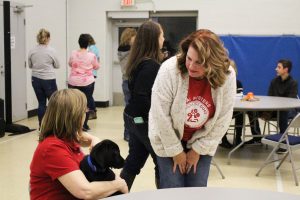
Besides mobility issues service dogs have broadened their mission. These highly trained dogs can enter into a family setting with a child who has developmental and/or intellectual disabilities. “These families,” explains Barlos, “gain so much from a service dog in their household. The dogs are a calming influence in the household, help a person develop responsibility and learn coping strategies. Service dogs can also help a client feel more secure in their environment, even help a child sleep in their own bed at night. That doesn’t seem like a big deal until you talk to parent who hasn’t been able to sleep through the night or sleep with their spouse because of the emotional security issues their child is facing.” That comfort provides not just the child independence, but the entire family.
In addition, service dogs are now being used in educational settings. “This is different than a visiting therapy dog,” says Barlos. “We have been placing school therapy dogs since 2005. These dogs are owned by the school under the auspicious of a primary handler. These dogs stay with their school. Our philosophy is that the dog belongs to the kids. The students see and experience the benefits of that dog throughout their experience at the school.”
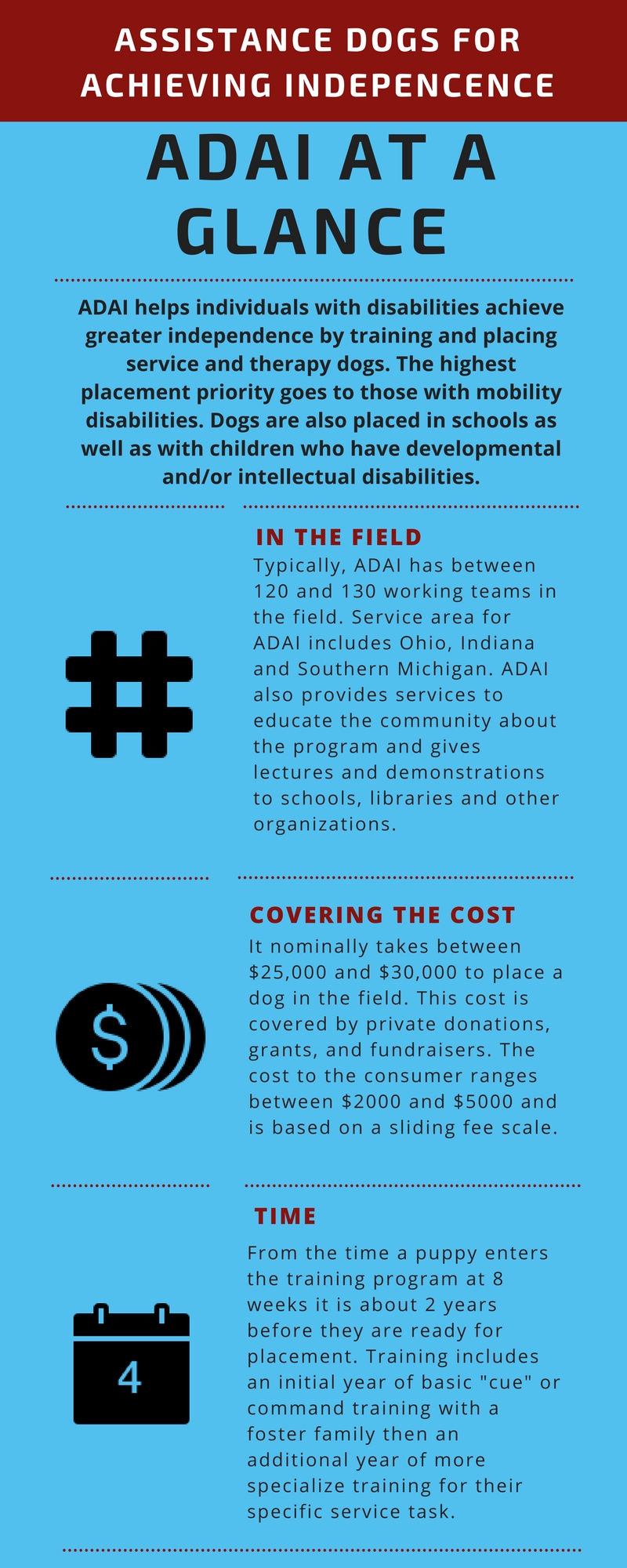 It’s an Assistance Dog’s Life
It’s an Assistance Dog’s Life
“Our dogs begin training right away,” says Anna Jones, Canine Services Manager for ADAI. “I oversee our dogs from the time we acquire them until they are ready to be placed.” Dogs are acquired through either a purchase or through our certified and carefully supervised breeding program. Jones, who received her Occupational Therapy Doctorate (OTD) from University of Toledo, started with ADAI as part of that education. “We start with puppies as early as 8 weeks. They go through our Puppy Smart Start Program for 2-4 weeks. Think of it as a puppy day care. We see how they do with each other and how they do with the families who sit with them at night.”
This small day care start is the beginning of a long training journey. “Once we do a puppy launch with their foster families we begin a yearlong training regime,” says Jones. During that year foster families work with their dogs 15-30 minutes a day and come in for classes once a week. “After 6 months we generally go to every other week.” Foster families also take their dogs on public outings, working to help socialize the dogs. “Our dogs have to be able to function in public,” says Jones. “This first year is so important in getting them ready for their service work.”
After the first year the dogs go through another testing phase. “If a dog is not appropriate for a service setting they move into our Fabulous Flunkies program,” says Jones. “A service dog has a lot of behavioral requirements that regular family pet does not, in particular how it behaves in public. Our goal is to ensure that both the dog and the person who is assisted by the dog remain safe and secure in all settings.” The dogs that move into the Fabulous Flunkies program get quickly adopted. “There is a waiting list for our Flunkies,” remarks Jones with both pride and amusement. “All around we have great dogs”
After the first year the dogs continue with their training, which includes a wide range of
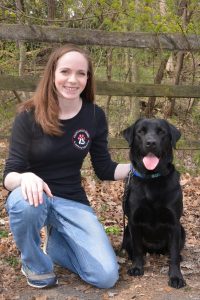
exposure to other service settings, specific task work and a final training phase with the ADAI trainers. “Our goal,” says Jones “is to ensure that our dogs know their service tasks. The total process is about 2 years. These dogs are ready.”
The Volunteer Core
At the heart of the entire process is volunteers. “We need families to help house, foster, sit with and train our dogs,” says Jones earnestly. “Without these amazing families we simply cannot function.” When looking at a two-year process, having a deep bench to help with the system is a constant battle.
Enter Mike Anstadt, one of the volunteers for ADAI. “I went to a fundraiser and then got interested,” says Anstadt, a retired software executive. “It was a graduation ceremony for fully ready serviced dogs. I watched as these animals were given over to the people whose lives they would forever enhance. I just wanted to help.” Anstadt went on to apply as a volunteer. “When I applied I had no idea what my involvement was going to be, whether just a sitter or helping around the kennels. After I applied ADAI did a home visit.” Part of the screening process for both sitting and fostering is to visit the potential family in their homes. “2 weeks later they said they wanted me to foster a dog.”
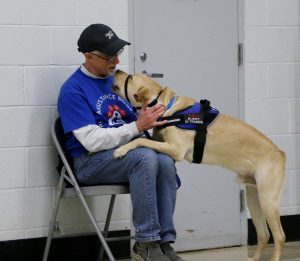
After the initial elation of being asked to be a foster, the realization set it. “There was a range of emotions. Happy that I was selected…sure. I was also scared because it is a big task. I had just started to learn about the process and I had reservations about the expectations.” The training starts out with all of the materials to raise a dog. Food, crate, and of course a leash. “Then you get your puppy and you start. It is an amazing journey.”
Although lengthy, the ADAI volunteers make the training seem effortless. “Once you have experienced the process,” says Jones, “you quickly become hooked. When we do our leash ceremony, the time when we pass the dog from foster to owner, our volunteers are eager to start again. Any thoughts or concerns about missing their trainee dogs dissolve.”
Anstadt agrees. “Our first thought after turning our dogs over is almost always ‘when do I get my next foster?’ When you come face to face with the person who will benefit from the training and work you know…truly know…that you have been part of something remarkable.” He pauses, letting his emotions settle. “We all say we want to change the world and do something positive for others. Working with ADAI has allowed me to do that and so much more. No matter where I am in helping with these animals and their families, I know that my service has impact. It is a total sense of fulfillment.”
For More Information
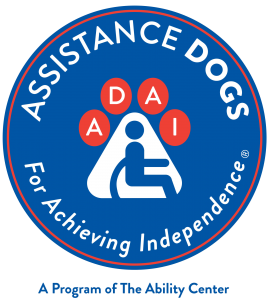
Assistance Dogs for Achieving Independence
A Program of The Ability Center of Greater Toledo







